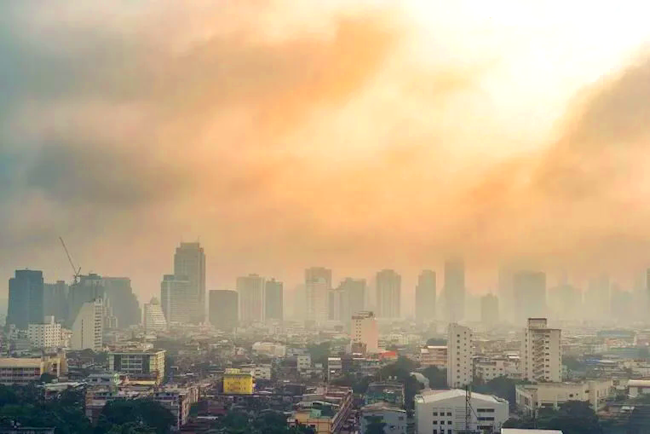Please take the air pollution in Bangkok seriously and wear a mask when warned!
There is now ample evidence linking short-term (one to two days) exposure to PM2.5 with an increased risk of acute myocardial infarction. Relative risk (RR) rises by approximately 1.5 to 2% for every 10 micrograms per cubic meter (µg/m³) of PM2.5.
Doctor Supachai Rotkajornnapalai has raised alarms about the dangers of PM2.5 air pollution, emphasising its underestimated impact on heart health.
The doctor shared a concerning case of a patient whose heart stopped despite not smoking, needing multiple medical interventions, including balloon angioplasty and defibrillation, to revive him.
A 48 year old patient suffered cardiac arrest today while playing football amid high levels of PM2.5 in Bangkok. Fortunately, emergency services arrived promptly, enabling life-saving measures before reaching Dr. Supachai.
The patient, with no prior medical conditions or history of smoking, was diagnosed with three blocked arteries and acute thrombosis in the coronary artery. During the procedure, the patient experienced severe arrhythmias, necessitating nearly 10 rounds of defibrillation alongside balloon angioplasty to stabilize his condition.
Long-term exposure to PM2.5 over months or years is associated with an even greater increase in the risk of acute coronary syndrome (ACS), with RR increasing by about 5 to 10% per 10 µg/m³ of PM2.5.
This occurs because PM2.5 triggers systemic inflammation and abnormal blood clotting, and stimulates the sympathetic nervous system, causing faster heart rates and higher blood pressure, thereby elevating the risk of heart ischemia.
Dr. Supachai highlighted that PM2.5 is a subtle yet significant threat, similar to the early days of Covid-19 awareness. Despite its lack of immediate symptoms, visibility, color, or smell, it poses serious health risks.
There is surprising complacency among both government and citizens regarding its dangers. Avoidance is advised, and if unavoidable, wearing masks when outdoors is recommended. Outdoor sports should be avoided during periods of heavy pollution, particularly by those with pre-existing health conditions.
Dr. Supachai advises caution and preventive measures akin to those practiced during the Covid-19 delta variant outbreak to ensure safety



